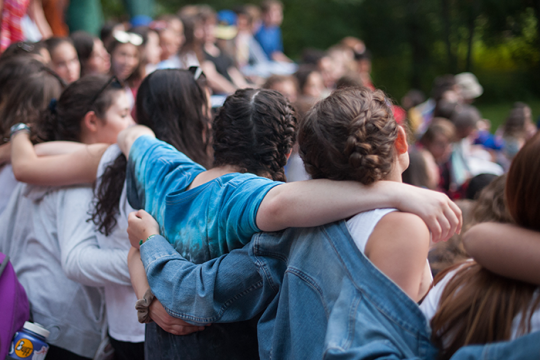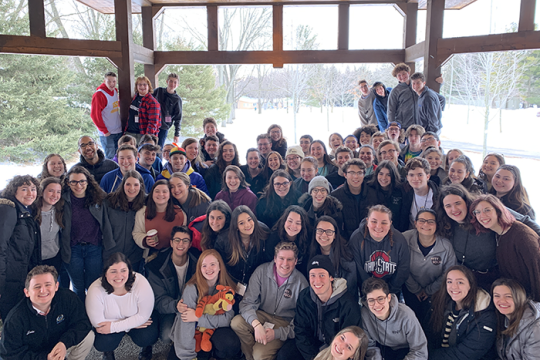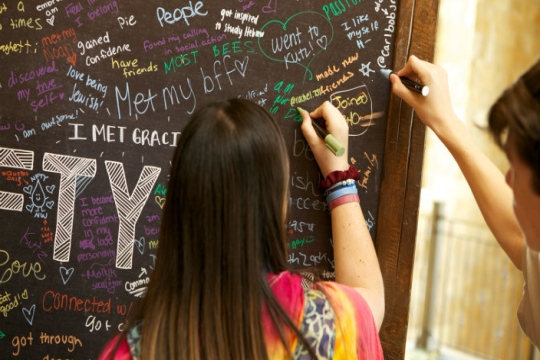By Mark S. Anshan
I had the privilege of serving as the National Federation of Temple Youth’s president from 1970-1971. In those years, my wife Brenda (from Bradford, PA) and I (a Torontonian) belonged to NELFTY (North Eastern Lakes Federation of Temple Youth), where I had served as president from 1968-1969.
We were witness to many historic and life-changing events during our years in NFTY. During the height of the Vietnam War, as NFTY’s first vice president, I had the unique opportunity of representing NFTY and giving testimony before Senator Edward Kennedy. Many of my friends were dealing with the draft, worried about the numbers they’d receive, and hoping for student deferment (as college students) to avoid serving, rather than going to fight in a war of questionable objectives. Senator Kennedy, chair of the Senate Judiciary Subcommittee on Administrative Practice and Procedure, held committee hearings on the selective service system (the draft), examining its operations, practices, and procedures. Senator Kennedy’s view was that the draft was administered in a discriminatory manner in which poor, black youth with much less opportunity to seek a university education were much more likely to be drafted, especially without the option of student deferment. On November 13, 1969, accompanied by Rabbi Merle Singer, I gave testimony on behalf of NFTY, delivering a written statement that became part of the public record of the committee’s deliberations. Senator Kennedy wrote to thank me for my testimony and sent me a copy of the hearings’ record.
The Vietnam War was one of the major issues to which we devoted our time and energy during the ‘60s. It had a profound effect on our thinking, especially for the American members of NFTY. As Canadians, we were also concerned about the war and its impact on what was happening in the United States. As draft dodgers found their way to Canada, the Canadian government faced several public policy challenges in its relationship with its closest ally. In 1970, war protests were occurring throughout the country; four students were killed at Kent State University. At Kutz Camp we created a ‘peace cabin’ (down by the lake) that was devoted to creating and distributing program materials on Jewish sources related to peace.
Israel was not as central to our thinking as it is today. The number of NFTYites who traveled to Israel was low compared to the numbers participating in our current NFTY Israel programs. We were, however, concerned about the future of Israel. In 1969, Doug Kahn (NFTY president), David Barish (third vice president), and I (first vice president) visited Abie Nathan on the docks in Manhattan’s Lower East Side. Abie was outfitting the Peace Ship on which he established the Voice of Peace radio station with the financial support of John Lennon. We went to offer our support and to determine how we might be able to recruit others to support his project for a multilingual radio station on the ship that would be anchored off the coast of Israel. The programming was used to convey messages of peace to everyone living in the region.
For all of us, 1968 and 1969 were quite memorable years. In April, 1968, Rev. Dr. Martin Luther King, Jr. was assassinated at the Lorraine Motel in Memphis. Two months later, Senator Robert Kennedy was killed in Los Angeles moments after winning the California primary in his bid to win the Democratic nomination for president. A year later, at Kutz Camp, on the evening of July 21st, all of us gathered in the lobby to watch on television as Neil Armstrong stepped onto the moon’s surface. Three weeks after that (August 15-18), several Kutz Camp staff members drove up the highway to Bethel, NY and became part of the Woodstock nation. They came back to camp with some interesting stories and also told us how much they enjoyed the music.
The Union of American Hebrew Congregations (now the Union for Reform Judaism) was also on the eve of changes in those years. Rabbi Maurice Eisendrath z”l, the Union’s president, directed that there be a youth delegation at the 1969 Biennial held at the Fountainebleu Hotel in Miami Beach. NFTY President Doug Kahn and I led the delegation, and Doug was given the honor of speaking at the plenary. At the 1973 Biennial in New York, many of us who had become close to Rabbi Eisendrath visited him in his suite just before Shabbat was to begin. An hour after we left him, he passed away as he was preparing to deliver his presidential sermon. Rabbi Alexander Schindler z”l stepped in to deliver Rabbi Eisendrath’s full sermon. As the UAHC’s new president, Rabbi Schindler continued to support the Union’s commitment to NFTY. For me, serving full time as NFTY president in the New York office allowed me to travel throughout the year to the NFTY regions and Union events, speaking and meeting with our members.
Many of us NFTYites from those wonderful and historic years have remained very close friends, sharing our families’ life-cycle events, remembering that it all started with our time in NFTY.
Mark S. Anshan was the first Canadian to serve as NFTY President (1970-1971). He is the past president of Holy Blossom Temple, ARZA Canada and ARZENU. He serves on the URJ Board of Trustees and is on the board of URJ’s Camp George. Mark is a lawyer, living in Toronto with his wife, Brenda Spiegler. They have two sons, Micah (married to Julie) and Adam. Mark is a Life Member of NFTY.
Related Posts
Image

Teen Programs in Full Swing with More on the Way!
There has been a lot happening in the teen and youth space over these past weeks, and many more opportunities are coming down the pipeline.
Image

Teens, Power, and NFTY – Growing our Reform Youth Movement
A few weeks ago, I had the joy of being at the "NFTY-GER Ball," one of the many NFTY events being run by Reform teen leaders across North America. A room full of teens gathered at Temple Sholom in Scotch Plains, NJ to dance, laugh, get to know one another, and celebrate Jewish life.
Image

A Note on Leadership from My 16-Year-Old Self
Almost exactly six years ago, I ran for NFTY-TOR regional president. I lost. And yet when I look back at my election materials in a bout of nostalgia, I stand by absolutely everything I said, now having seen how much the ideas I mentioned still influence me and the way I think about leadership, both personally and as an organizer working with NFTY and Reform Jewish teen leadership.